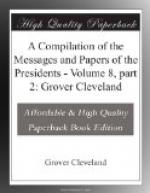And if with less money, or money more easily paid, we can preserve the benefits of the Union by this means than we can by the war alone, is it not also economical to do it? Let us consider it, then. Let us ascertain the sum we have expended in the war since compensated emancipation was proposed last March, and consider whether if that measure had been promptly accepted by even some of the slave States the same sum would not have done more to close the war than has been otherwise done. If so, the measure would save money, and in that view would be a prudent and economical measure. Certainly it is not so easy to pay something as it is to pay nothing, but it is easier to pay a large sum than it is to pay a larger one. And it is easier to pay any sum when we are able than it is to pay it before we are able. The war requires large sums, and requires them at once. The aggregate sum necessary for compensated emancipation of course would be large. But it would require no ready cash, nor the bonds even any faster than the emancipation progresses. This might not, and probably would not, close before the end of the thirty-seven years. At that time we shall probably have a hundred millions of people to share the burden, instead of thirty-one millions as now. And not only so, but the increase of our population may be expected to continue for a long time after that period as rapidly as before, because our territory will not have become full. I do not state this inconsiderately. At the same ratio of increase which we have maintained, on an average, from our first national census, in 1790, until that of 1860, we should in 1900 have a population of 103,208,415. And why may we not continue that ratio far beyond that period? Our abundant room, our broad national homestead, is our ample resource. Were our territory as limited as are the British Isles, very certainly our population could not expand as stated. Instead of receiving the foreign born as now, we should be compelled to send part of the native born away. But such is not our condition. We have 2,963,000 square miles. Europe has 3,800,000, with a population averaging 73-1/3 persons to the square mile. Why may not our country at some time average as many? Is it less fertile? Has it more waste surface by mountains, rivers, lakes, deserts, or other causes? Is it inferior to Europe in any natural advantage? If, then, we are at some time to be as populous as Europe, how soon? As to when this may be, we can judge by the past and the present; as to when it will be, if ever, depends much on whether we maintain the Union. Several of our States are already above the average of Europe—73-1/3 to the square mile. Massachusetts has 157; Rhode Island, 133; Connecticut, 99; New York and New Jersey, each 80. Also two other great States, Pennsylvania and Ohio, are not far below, the former having 63 and the latter 59. The States already above the European average, except New York, have increased in as rapid a ratio since passing that point as ever before, while no one of them is equal to some other parts of our country in natural capacity for sustaining a dense population.




